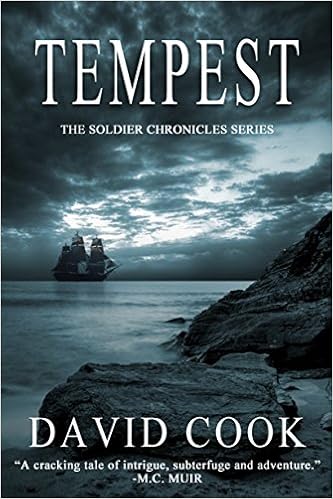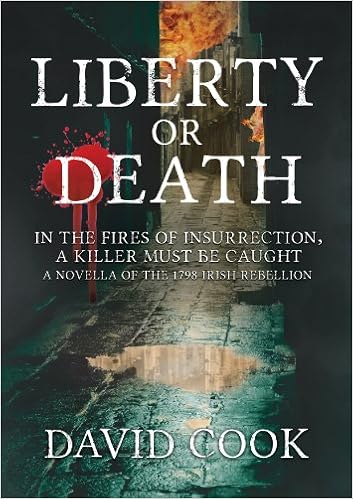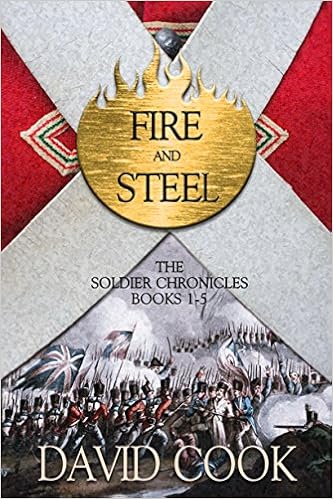In a mood for some military history but not sure if you can commit to the next 500-pager? Maybe you should check out David Cook's series of novellas The Soldier Chronicles. Each novella is bite-size masterpiece, packed with impeccable research and fast-paced action. Some spectacular battles and unforgettable characters.
___________________________________
MJN: Your Soldier Chronicle series covers a range of
historical events. Are the books tied by any themes or characters?
DC: The Soldier Chronicles will
encompass the years 1793-1815 and are companion pieces to another twenty volume
story arc. I want to get the attention of an agent to go the traditional
route for these. So far a half dozen rejections, but I'm continuing to
search. All the main characters from the Chronicles
will appear in the main story arc. The main theme is one of overcoming the
odds. Succeeding when things look impossible. Faith. All the characters
have flaws though. I hope with each new book, as I sharpen my craft,
the characters will become even more alive, human and believable.
I called it the Soldier Chronicles because every main character is from the United Kingdom and Ireland (was originally called the Union Flag Chronicles in honour at the countries they come from but I thought any ACW enthusiasts might confuse it with the Union and Confederates, so changed it. All the Chronicles are standalones though and can be read in any order.
MJN: Your covers are absolutely stunning. One thing I noticed over the years of reading historical fiction is that some authors - and even cover artists working for big publishers - often place images from a different era. They pic an image because it "looks catchy", even if it doesn't fit the era described in the book. Do you make a conscious effort to avoid anachronisms?
I called it the Soldier Chronicles because every main character is from the United Kingdom and Ireland (was originally called the Union Flag Chronicles in honour at the countries they come from but I thought any ACW enthusiasts might confuse it with the Union and Confederates, so changed it. All the Chronicles are standalones though and can be read in any order.
MJN: Your covers are absolutely stunning. One thing I noticed over the years of reading historical fiction is that some authors - and even cover artists working for big publishers - often place images from a different era. They pic an image because it "looks catchy", even if it doesn't fit the era described in the book. Do you make a conscious effort to avoid anachronisms?
DC: I make sure
that my designer knows exactly what I want. My ideas for TEMPEST, just released
were: dark skies, waves, a storm brewing, a ship looking in the distance. That
was it. A few tweaks and a stock photo with some manipulation and texts and it’s
the best one yet. It all comes down to budget as well. One of my early covers I
struggled to like even when giving final proof the nod. The money wasn't there
to make it how I wanted it, so had to settle with something else. I do
hope each cover is eye-catching. It has to be, no question about that.
MJN: Liberty of Death is set in 1798, featuring the Irish rebellion with assistance from the French. There were several novels written about that historical event. And there is an entire repertoire of rebel songs that came out of that era. In fact, the Fenian movement of the 1860s adopted many of those songs. Can you name a few?
MJN: Liberty of Death is set in 1798, featuring the Irish rebellion with assistance from the French. There were several novels written about that historical event. And there is an entire repertoire of rebel songs that came out of that era. In fact, the Fenian movement of the 1860s adopted many of those songs. Can you name a few?
DC: Short answer
no. I do know some AMC songs and I know some songs sung twenty years after the
War of Independence such as Yankee Doodle. That sung was well known during the
Irish Rebellion by British troops. However, you'll find there are some songs
that have been altered over the years that are actually two hundred years
earlier.
MJN: Your Soldier Chronicles are a series of novella length works. It takes special talent to condense such intense historical events into a shorter fiction form. People are so used to historical novels being 500 page giants.
DC: The Chronicles were designed from the
start to be novellas. Plain and simple. They started out as character
backstories and then edited several drafts later, swelling them to 43k words. I
wanted them as just snapshots of historical events. Easy reads where reader
can just get straight into the tale. It's difficult to write them to make sure
the backdrop is historically correct and then the characters story
fits.
MJN: Have you visited the actual historical sites where your novellas are set?
MJN: Have you visited the actual historical sites where your novellas are set?
DC: Yes, some of
them. Ireland, Malta & Gozo, Belgium and Wales. I think it's
vitally important to see the ground you're writing about. He can get a
sense of the place, the smells, the sounds. I try to go at the same
time in the year that the event happened. At Waterloo I was there on the
battlefield, sat on the ridge where Napoleon massed artillery tried to
blast a way through Wellington's line, to pound the ridge, soften it for his
infantry. Throughout the day, and I stayed there all day, I had goose
bumps. I didn't see any ghosts, but I was on hallowed ground. I got
interviewed by a French TV crew and I explained I was there not
to celebrate a British/allied victory, but to honour all the men that
fell. I think they were quite surprised by that!



No comments:
Post a Comment